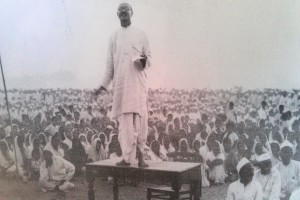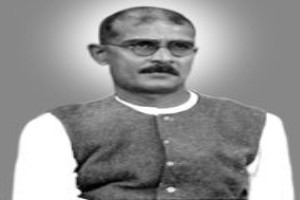
Mahadev Desai addressing a public meeting on a dry Sabarmati’s river bed. He was arrested later.
 By Mahadev Desai*
By Mahadev Desai*
(While Gandhiji was on the March to Dandi as part of the Salt Satyagraha, Mahadevbhai was entrusted with the task of mobilising volunteers in Gujarat for breaking the salt law. This article was published in Harijan on September 8, 1940)
And here with some apology I propose to revive an incident that happened in my own life in the Satyagraha days of 1930.
I was on the crest of a wave of popularity, having been ‘dictator’ for about a month[1], and crowds followed the prison-van in which I was being taken to the prison after my conviction. Some of them wanted to load me with garlands, but the English sergeant on the back of the van would not stop. I was appealing to the crowds to go back, but they chased the car, and when they found that it was a futile chase they flung a stone at the sergeant. It hit him right on the chin and gave him a nasty cut. “Ah,” he exclaimed in agony, catching the stone as it fell from his face. “See what your wretched people do! If they adhered to non-violence we should have nothing to say, but they exploit Gandhi and his non-violence.”
Also read:History Recalled: A visit to Jamshedpur
I expressed my intense sorrow and begged him to stop the van so that I might ask the crowds to apologise to him and make amends. But it was useless, and he again began to curse our people and ‘satyagrahis’. “But,” I pleaded with him, “what can I do shut up in this van? I can assure you I am deeply pained and ashamed and would do whatever amends you would suggest. Come along, hit me with the stone, it will be good.”
“No, no,” said the sergeant, now relenting.
I said, “I mean what I say, you give me the stone, and I shall inflict pain on myself with it, if only it will pacify you.”
But there was a wire netting between him and me, and he laughed. “I know you mean what you say,” he said, “but it is these folks that spoil your game. Very few are like you. Look at what they have done at Peshawar. Why can’t such people clear out of the movement?” He had read the newspapers and had believed the reports attributing violence to the Khudai Khidmatgars.
“I know nothing about it,” I said, “all I can do is to offer you my heartfelt apologies.”
“No, please,” he said, “I understand. I am not blaming you. I am blaming the people who are ruining your movement.”
The van now went past the Sabarmati Ashram, and I invited him to come to my house in better days. “I should be delighted if you came. And now perhaps you would give me your name?” I said. He repeated it twice but I could not catch it. “Won’t you write it down?” I asked. “Certainly,” he said, “but I have neither pen nor pencil.”
I handed him my fountain pen through the wire netting, and he wrote his name down a slip of paper. In a moment we were at the jail gates. He proceeded to return to me my pen. But I said: “No, I would ask a favour of you, as you have been so good. You have that stone in your pocket. Give it to me and keep the pen instead. Don’t you think it will be a better memento?”
“Most gladly”, he said and gave me the stone, and with overflowing appreciation put the pen away in his pocket. I took the stone and threw it away. “Pray fling even the memory of it away,” I said. “It is gone,” he said and rushed away.
Two years after the incident, I was being transferred from one jail to another and at Poona station was put into a taxi by the Police Inspector in charge. As the taxi was moving, a sergeant came running towards it, asking the men to stop. I thought there was a fresh trouble. But lo and behold, it was the same Sergeant Dangerfield who had recognised me and simply came to shake hands with me.
“Well, well,” he said, “that incident appeared in the papers, and I was as a result immediately transferred from Ahmedabad.” “But, I do not mind it,” he added with a smile, and waved good-bye.
I saw that a slight gesture of ahimsa had won me a friend that day.
*Mahadev Desai was an eminent freedom fighter and Mahatma Gandhi’s personal secretary; article courtesy his grandson, Nachiketa Desai.




